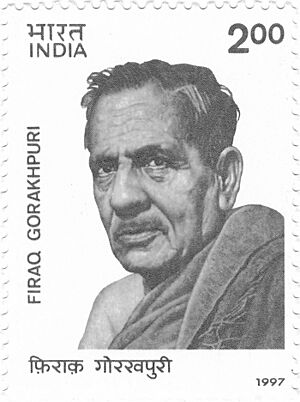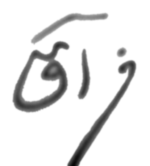Firaq Gorakhpuri facts for kids
Quick facts for kids
Firaq Gorakhpuri
فراق گورکھپوری |
|
|---|---|
 |
|
| Born | Raghupati Sahay 28 August 1896 Gorakhpur, North-Western Provinces, British India |
| Died | 3 March 1982 (aged 85) New Delhi, India |
| Pen name | Firaq Gorakhpuri فراق گورکھپوری |
| Occupation | Poet, writer, critic, scholar, lecturer, orator |
| Language | Urdu, English, Hindi |
| Nationality | Indian |
| Education | M.A. in English literature |
| Alma mater | Allahabad University |
| Genre | Poetry, Literary criticism |
| Notable works | Gul-e-Naghma |
| Notable awards | Padma Bhushan (1968) Jnanpith Award (1969) Sahitya Akademi Fellowship (1970) |
| Signature | |
 |
|
|
|
|
Raghupati Sahay (born August 28, 1896 – died March 3, 1982), known by his pen name Firaq Gorakhpuri, was a very famous Indian writer and Urdu poet. Many people consider him one of the most important Urdu poets of his time. He stood out among other great poets like Muhammad Iqbal and Josh Malihabadi.
Contents
Life and Achievements
Early Life and Education
Raghupati Sahay was born on August 28, 1896. His birthplace was a village called Banwarpar in the Gorakhpur district. He came from a family that valued education.
He completed his basic schooling and then earned a master's degree. He studied Urdu, Persian, and English literature.
A Poet's Journey
Firaq showed a talent for Urdu poetry from a young age. He was always drawn to literature. Even with famous poets like Allama Iqbal and Faiz Ahmed Faiz around, he quickly made his own mark.
He was chosen for important government jobs. These included the Provincial Civil Service (P.C.S.) and the Indian Civil Service (British India) (I.C.S.). However, he chose to resign from these roles.
Joining the Freedom Movement
Firaq decided to support Mahatma Gandhi's non-cooperation movement. This movement aimed for India's independence from British rule. Because of his involvement, he was sent to jail for 18 months.
After his release, he started working at Allahabad University. He became a lecturer, teaching English literature. It was during his time here that he wrote most of his famous Urdu poems.
Literary Masterpiece and Awards
His most important work is Gul-e-Naghma. This book of poetry won him India's highest literary honor, the Jnanpith Award. He also received the Sahitya Akademi Award in Urdu in 1960 for the same work.
Throughout his life, Firaq held important positions. He was a research professor at the University Grants Commission. He also worked as a Producer Emeritus for All India Radio.
Poetic Styles and Writings
Gorakhpuri was skilled in many traditional poetry styles. These included ghazal, nazm, rubaai, and qat'aa. He wrote more than ten books of Urdu poetry.
He also wrote several books of Urdu prose. In addition, he published many works on literary topics in Hindi. He even wrote four books in English about literature and culture.
His nephew, Ajai Mansingh, wrote a biography about him. It is titled Firaq Gorakhpuri: The Poet of Pain & Ecstasy. This book was published in 2015. It shares stories from Firaq's life and translations of some of his poems.
Notable Works
Here are some of Firaq Gorakhpuri's well-known books:
- Gul-e-Naghma گلِ نغمہ
- Gul-e-Ra'naa گلِ رعنا
- Mash'aal مشعال
- Rooh-e-Kaayenaat روحِ کائنات
- Roop رُوپ (Rubaayi رُباعی )
- Shabnamistaan شبنمِستان
- Sargam سرگم
- Bazm-e-Zindagi Rang-e-Shayri بزمِ زندگی رنگِ شاعری
Awards and Recognition
Firaq Gorakhpuri received many important awards for his literary contributions:
- 1960 – Sahitya Akademi Award in Urdu
- 1968 – Padma Bhushan
- 1968 – Soviet Land Nehru Award
- 1969 – Jnanpith Award (He was the first to win this award for Urdu literature)
- 1970 – Sahitya Akademi Fellowship
- 1981 – Ghalib Academy Award
Later Life and Legacy
Firaq Gorakhpuri passed away on March 3, 1982, at the age of 85. He believed strongly in secularism throughout his life. He played a very important role in ensuring that Urdu was not seen as a language only for Muslims.
 | Mary Eliza Mahoney |
 | Susie King Taylor |
 | Ida Gray |
 | Eliza Ann Grier |

